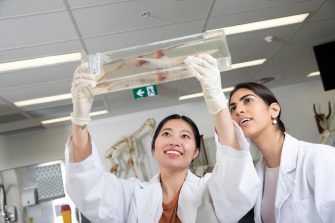About us

We see meaning and patterns where others see bits and bytes
The UNSW Data Science Hub (uDASH) unites UNSW’s full spectrum of data specialists to solve complex, real-world challenges–your challenges. We translate the data generated by business, government and industry into a story. And from that story, we create a solution.
In today’s world, we are inundated by large amounts of information that is often left meaningless without a central body through which it can be curated and interpreted. Our uDASH team comprises more than 100 data scientists from across UNSW in the fields of psychology, medicine, physics, law, mathematics, education, business, marketing and economics.
When you collaborate with us, you are matched to a specialised team of uDASH scientists who will work with you to develop a scope of research. We work to help you achieve your desired outcomes and insights from your data. These data could be experimental findings, survey outcomes (and design), user behaviour or even the irregular distribution of trees. We undertake deep analyses with our suite of tools, algorithms and visualisations, and apply powerful proprietary models and simulations.
We ask the questions to reveal the bigger picture, so you can see the forest beyond the trees.
Our themes
As a broad, but by no means exhaustive grouping, the research of uDASH data science can be divided into six primary themes:

1. Fundamental Data Science
Fundamental data science is concerned with developing the foundations of new data science theory, methods, and tools. These will typically have their roots in Mathematical, Statistical or Machine Learning.

2. Environmental & Sustainability
Environmental data science is concerned with generating new data-driven insights into environmental problems at all scales from the microbial to the globe. New complex and large datasets now exist from earth observation platforms, from spatial and temporal climate, and from biodiversity observations including (meta-)genomics. Using these datasets in informative ways requires an emerging set of complex methods. This theme facilitates the connection of method experts with environmental experts to address these environmental problems.

3. Health Data Science
Health data science is concerned with generating data-driven solutions to complex real-world health problems (in a broad definition) through the comprehension of complex big data and development/employment of customised analytical, statistical and machine learning approaches. The theme addresses both fundamental and translational research questions in a wide range of areas including health, medicine, pharmacology, psychology, and biology.

4. Sports analytics & management
The UNSW Data Science Hub (uDASH) is at the forefront of pioneering research in collaboration with leading sporting organizations and innovative sports technology startups. With a multidisciplinary team comprising data scientists, analysts, engineers, and domain experts, uDASH drives initiatives that utilize statistics, data science, machine learning, and AI to drive performance and innovation in sports and related industries. Our focus research includes, but is not limited to, enhancing performance, driving fan engagement, enhancing event management, ensuring financial stability, and achieving community impact.
Over the past years, uDASH has successfully launched research projects and HDR scholarships in partnership with sporting organizations such as Surfing Australia, Football Australia, and NSW Rugby League. We’ve collaborated with forward-thinking sports technology startups like Platypus Medtech, Reaction Performance, Mitosportz, and Splink. These initiatives demonstrate the need and power of data-driven insights and can lead to tangible advancements in athlete performance and sports technology innovation. Our team of researchers has completed research projects demonstrating data analytics’ impact across various sporting codes like football, rugby, and gymnastics with international partners such as Bayern Munich FC, Red Bull, and Fujitsu.

5. Space & Defence
The Space & Defence research theme uses data science and machine learning tools to support the space and defence industry. We work with diverse industry partners both in Australia and internationally to extract value, knowledge, and resilience from datasets including earth observation, remote sensing, autonomous vehicles, and IoT sensors.

6. Data4Good
Data4Good aims to use the power of data to help drive systemic change for the good of society. We help organisations understand and make the best use of their data for maximum impact and to drive change. We are particularly passionate about Education, Climate Change, Gender Equity and Policy and Justice.
